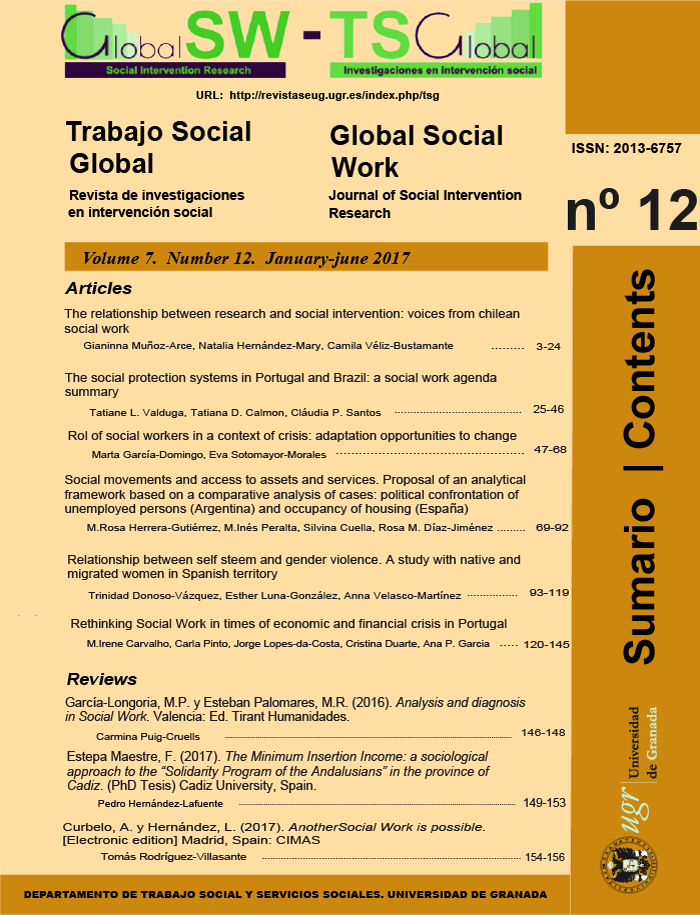The relationship between research and social intervention: voices from chilean social work
DOI:
https://doi.org/10.30827/tsg-gsw.v7i12.5573Keywords:
social research, social intervention, social work, ChileAbstract
This article discusses preliminary findings from a sequential exploratory study aimed to examine the relationship between research and intervention from the perspective and experiences of Chilean social workers. Drawing upon thematic analysis of 17 interviews with frontline social workers, the findings suggest that a comprehension of social work as a practical domain pervades the interviewees’ accounts. However, dissenting voices are also identified, in which social research is seen as a strategy that may help reinforce social workers´ commitment with emancipation. The barriers to the integration of research in social workers’ interventions are discussed, and academic and professional challenges in this field are identified.
Downloads
References
Aquín, N. (2006). Reconstruyendo lo social: prácticas y experiencias de investigación desde el Trabajo Social. Buenos Aires: Espacio.
Aylwin, N., Forttes, A., Matus, T. (2004). La reinvención de la memoria: indagación sobre el proceso de profesionalización del Trabajo Social chileno 1925-1965. Santiago de Chile: PUC.
Castañeda, P., Salamé, A.M. (2014). Trabajo social chileno y dictadura militar. Rumbo TS, 9, 8-25.
Celats, Centro Latinoamericano de Trabajo Social. (1992). La investigación en trabajo social. Lima: Celats-Alaets.
Colegio de Trabajadoras y Trabajadores Sociales de Chile (2013). Trabajadores sociales detenidos desaparecidos. Recuperado de http://www.trabajadoressociales.cl/provinstgo/
Creswell, J. (2009). Research design. Qualitative, quantitative, and mixed methods approaches. London: Sage.
Denzin, N. (2012). How many qualitative interviews is enough? En National Centre for Research Methods (Ed.) How many qualitative interviews is enough? Expert voices and early career reflections on sampling and cases in qualitative research (pp. 23-24). London: National Centre for Research Methods.
Faleiros, V.P. (2014). O serviço social no cotidiano: fios e desafíos. Serviço Social e Sociedade, 120, 706-722.
Falla, U. (2009). Reflexiones sobre la investigación social y el Trabajo Social. Tabula Rasa, 10, 309-326.
Fitoussi, J.P., y Rosanvallon, P. (1997). La nueva era de las desigualdades. Buenos Aires: Manantial.
Fraga, C. (2010). A atitude investigativa no trabalho do assistente social. Serviço Social e Sociedade, 101, 89-99.
Garrett, M. P. (2013). Social work and social theory. Making connections. Bristol: The Policy Press.
González, M. (2016). Conocer, luchar, enseñar. Avances pioneros de la investigación y la producción intelectual desde el trabajo social. En: P. Vidal (Ed.) Trabajo social en Chile (pp. 119-140). Santiago de Chile: RIL.
Grassi, E. (2011). La producción en investigación social y la actitud investigativa en el trabajo social. Debate Público. Reflexión de Trabajo Social, 1, 127-139.
Guerra, Y. (2009). A dimensão investigativa no exercício profissional. In: CFESS/ ABEPSS (Comps.) Serviço Social: direitos sociais e competências profissionais (pp. 701‑718). Brasília: CFESS/Abepss.
Harvey, D. (2007). A brief history of neoliberalism. Oxford: Oxford University.
Heidegger, M. (2003). Ser y tiempo. Madrid: Trotta.
Hesse-Biber, S., Rodríguez, D. & Frost, N. (2015). A qualitative driven approach to multimethod and mixed methods research. En: S. Hesse-Biber & R. Burke Johnson (Eds.) The Oxford handbook of multimethod and mixed methods research inquiry (pp.3-20). London: Oxford University.
Iamamoto, M. V. (1998). Ensino e pesquisa no serviço social: desafíos na construção de um projeto e formação profissional. Caderno Abess, 8, 9-15.
Illanes, M.A. (2006). Cuerpo y sangre de la política. La construcción histórica de las visitadoras sociales (1887-1940). Santiago de Chile: Lom.
Kvale, S. (2011). Las entrevistas en investigación cualitativa. Madrid: Morata.
Martinelli, M. L. (2005). Pesquisa qualitativa: elementos conceituais e teórico-metodológicos. Encontro de pesquisadores do Instituto de Ciências da Sociedade e Desenvolvimento Regional. Campos dos Goytacazes, Brasil.
Mota, A.E. (2014). Espaços ocupacionais e dimensões políticas da prática do assistente social. Serviço Social e Sociedade, 120, 694-705.
Neuman, L. & Robson, K. (2012). Basics of social research. Qualitative and quantitative approaches. Toronto: Pearson.
Red de Investigadores en Trabajo Social. (2015). Investigar en trabajo social. Recuperado de http://www.redinvestigaciontrabajosocial.cl/
Rubilar, M.G. (2009). ¿Cómo hacen investigación los trabajadores sociales? Una primera aproximación a las experiencias de investigación de una generación de profesionales chilenos. Revista de Trabajo Social 76, 17-34.
___________ (2013). Repertorios y aproximaciones biográfico-narrativas. Testimonios y análisis de prácticas investigativas en trabajadores sociales. Forum Qualitative Social Research, 14 (2), 32-45.
___________ (2015). Trabajo social e investigación social. ¿Cómo hacen investigación los trabajadores sociales? Memoria y testimonios de cuatro generaciones de profesionales chilenos. Universidad Complutense de Madrid, España.
Silverman, D. (2013). Qualitative research. London: Sage.
Souza Moraes De, C.A. (2015). A particularidade da dimensão investigativa na formação e prática profissional do assistente social. Serviço Social e Sociedade, 122, 294-316.
Souza Moraes De, C.A., De Moura Junca, D.C. y De Sá Santos, K. (2010). Para quê, para quem, como? Alguns desafios do cotidiano da pesquisa em serviço social. Serviço Social e Sociedade, 103, 433-452.
Downloads
Published
How to Cite
Issue
Section
License
Authors publishing in this journal agree to the following terms:
- Authors retain their copyright. They guarantee to this journal the right to a first publication of the work submitted to initiate the editorial process.
- Authors know that their work is published under a Creative Commons License which allows others to share it, with a recognition of the work's authorship and its initial publication in this journal.
- Authors share with Global Social Work explotation rights of the work that has been published in this journal, authorizing the execution of a free reproduction, distribution and public communication. Authors know that their work will be stored on servers and reproduced in digital format for inclusion in institutional repositories and databases that will facilitates free access to the full text of the work.
- Authors may distribute the version of the work published in this journal (for example, to an institutional repository or publish it in a book), with the explicit acknowledgment of its initial publication in this journal.
Copyright on the texts published in Trabajo Social Global -Global Social Work, as well as editorial policy of the journal refering to self-file and deposit in institutional or thematic repositories, are identified in the database





















